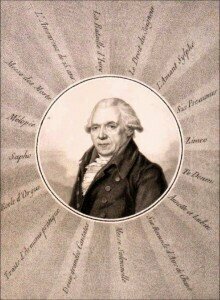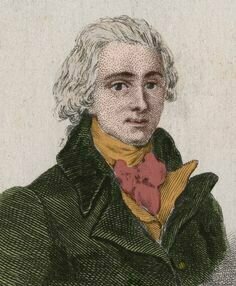
Jean-Paul-Égide Martini
On a list of the most popular love songs in classical music, Plaisir d’amour (The pleasure of love) would undoubtedly rank supremely high. Originally composed in 1784, Hector Berlioz arranged the tune for orchestra, and various pop-music settings include the steamy 1961 Elvis Presley adaptation “Can’t Help Falling in Love.” The original text comes from a poem by Jean-Pierre Claris de Florian (1755–1794), who had used it in his novel Célestine:
Plaisir d’amour ne dure qu’un moment, | The pleasure of love lasts only a moment, |
chagrin d’amour dure toute la vie. | The grief of love lasts a lifetime. |
|
|
J’ai tout quitté pour l’ingrate Sylvie, | I gave up everything for ungrateful Sylvia, |
Elle me quitte et prend un autre amant. | She is leaving me for another lover. |
Plaisir d’amour ne dure qu’un moment, | The pleasure of love lasts only a moment, |
chagrin d’amour dure toute la vie. | The grief of love lasts a lifetime. |
|
|
"Tant que cette eau coulera doucement | As long as this water will run gently |
vers ce ruisseau qui borde la prairie, | Towards this brook which borders the meadow, |
je t’aimerai", me répétait Sylvie, | I will love you", Sylvia told me repeatedly. |
l’eau coule encor, elle a changé pourtant. | The water still runs, but she has changed. |
|
|
Plaisir d’amour ne dure qu’un moment, | The pleasure of love lasts only a moment, |
chagrin d’amour dure toute la vie. | The grief of love lasts a lifetime. |

Jean-Pierre Claris de Florian
Only a French poet can capture the essence of longing in such clarity and beauty, don’t you agree? And the same of course goes for the musical setting by Jean-Paul-Égide Martini (1741-1816). Let’s not jump to conclusions that quickly, since Martini was born Johann Paul Aegidius Martin in Bavaria! Educated in a Jesuit seminary, he later studied philosophy in Freiburg but abruptly discontinued his education. He first changed his name to “Schwarzendorf” hoping to avoid having to pay a refund for his educational costs, and subsequently moved to France under the new name “Martini.”
He did become a successful court musician directing concerts for Marie Antoinette, and adapting to the new political realities brought on by the French Revolution, later served Napoleon and the restored Chapelle Royale. His light operas enjoyed great success, as did his chansons including “Plaisir d’amour.” Eventually appointed professor of composition at the Paris Conservatoire, Johann Martin—sorry, Jean-Paul-Égide Martini—died in Paris in February 1816. Just goes to show, love is universal after all!
For more of the best in classical music, sign up to our E-Newsletter
Jean-Paul-Égide Martini: Plaisir d’amour

One of the most beautiful love songs of all time.
I agree! This is truly one of the most beautiful love songs of all time! Can’t think of even one song more beautiful than “ Plaisir d’Amour.”
And it is my favorite song sung by Elvis Presley.
Yes, I agree!
Featured in DoDoSolSolLaLaSol. Korean movie on Netflix.
Hjkjr
My husband, a former member of the Metropolitan Opera sang this to me at Victor’s Cafe in Philadelphia. He is now deceased and it is 35 years later but I still feel the effects of this most beautiful melody sung by his most powerful bass voice.
Thank you very much for sorting out the complicated story of this beautiful song and its composer! The link to Kathleen Battle on You Tube is very welcome: her voice appears to be flawless, and the film background is suitably dramatic.